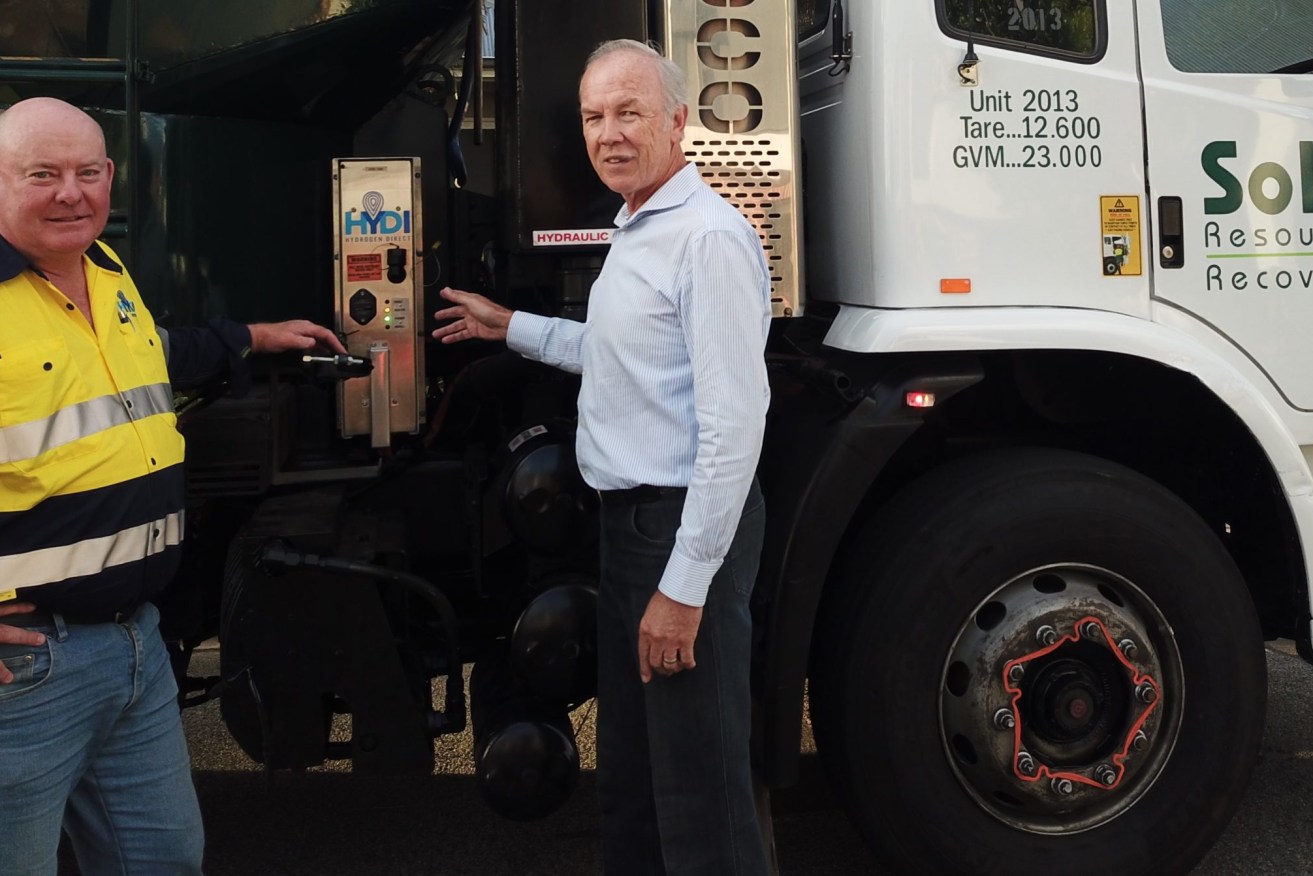SA hydrogen device aiming to reduce truck emissions
An Adelaide council’s garbage truck is among a small fleet of rubbish and recycling vehicles across the country to be fitted with a South Australian hydrogen device designed to save fuel and reduce emissions.


HYDI Managing Director John Wilson and HYDI Chief Executive Officer Roger van der Lee inspect one of their units fitted to a Solo Resource Recovery vehicle. Image: supplied.
Adelaide-based manufacturer Hydrogen Direct Injection’s (HYDI) hydrogen technology was last month fitted to a handful of Solo Resource Recovery’s 500 waste garbage and recyclable trucks across the country, including one servicing the City of West Torrens.
HYDI managing director John Wilson said excavators, road sweepers, garbage and recycling trucks and prime mover trucks across Australia – including up to 100 vehicles in South Australia – could be fitted with the device, if the units were shown to provide fuel efficiency and a reduction in carbon emissions.
An independent study by the University of South Australia last year found the HYDI device reduced diesel consumption in a range between 5-13 per cent, lowered diesel particulate matter emissions by 25–80 per cent and removed 7–25 per cent of carbon monoxide.
In a separate five-month trial, a public transport passenger bus operating in suburban Adelaide fitted with HYDI delivered an average fuel saving of 12.5 per cent.
As part of the agreement Solo Resource Recovery will trial the devices on prime mover trucks as well as garbage and recyclable trucks in Perth, NSW and South Australia.
HYDI said the device was also being trialled in New Zealand, the Netherlands, Scotland, Great Britain and Egypt for mining equipment and generators, prime mover trucks, garbage trucks and public buses.
Trade and Investment Minister Stephen Patterson welcomed the use of the device in South Australia.
“An innovation which reduces carbon emission in our community is to be welcomed,” he said.
“The State Government’s Hydrogen Action Plan will help South Australia be a supplier of choice for green hydrogen in Australia, and South Australia is well placed to attract a substantial portion of the massive economic activity through hydrogen exports, forecast to contribute $1.7 billion and 2800 jobs to the national economy by 2030.”
HYDI’s device is designed to fit to the rear of a truck cabin, with the units varying in size depending on the engine capacity they are serving.
They produce their own hydrogen through an electrolysis process using distilled water in a two-litre tank that can run for 70 hours before needing to be refilled. An option of an auxiliary tank can also be added for engines that run constantly or in remote areas.
The company says the hydrogen is directly injected into the air-fuel mixture just prior to combustion, helping the mixture to ignite faster and more completely and resulting in greater power using less fuel and creating fewer emissions.
Wilson said the chemical-free nature and low power draw of HYDI made it safe while other hydrogen systems on the market used electrolytes or alkaline solutions that were potentially volatile and raised safety concerns.
He said the technology also had potential substantial economic and environmental benefits.
“While attention is focused on future technologies which usually require huge investment and long lead times, it needs to be remembered that our existing heavy industry, transport and bus assets have a life cycle of 20 years or more,” he said.
“We can make a significant and immediate contribution to reducing the 29 per cent of carbon emissions attributed to transport with our retrofit unit, which pays for itself via reduced fuel consumption.”
Solo’s South Australian Manager Adrian Rose said the company believed the HYDI technology offered an opportunity to reduce its carbon footprint in an economically sustainable way.
“This initiative is a tangible commitment by Solo Resource Recovery to reduce carbon emissions using technology which is economic and immediate in effect,” Rose said.
“We believe we have a responsibility to the communities in which we operate, and to the world at large, to contribute to a net zero carbon emissions objective.”




